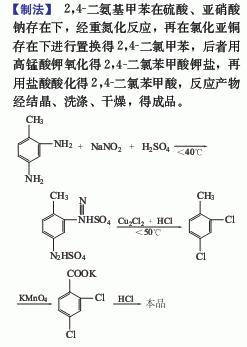
Structural formula
| Physical competition number | 014V |
|---|---|
| Molecular formula | C7H4Cl2O2 |
| Molecular weight | 190 |
| label |
3-4-Dichlorobenzoic acid, herbicide |
Numbering system
CAS number:51-44-5
MDL number:MFCD00002492
EINECS number:200-099-2
RTECS number:DG7175000
BRN number:2044777
PubChem number:24862562
Physical property data
1. Properties: White crystal.
2. Density (g/mL, 25/4℃): Undetermined
3. Relative vapor density (g/mL, air=1): Undetermined
4. Melting point (ºC): 208.5
5. Boiling point (ºC, normal pressure): Undetermined
6. Boiling point (ºC, 5.2kPa): Undetermined
7. Refractive index: Undetermined
8. Flash point (ºC): Undetermined
9. Specific rotation (º): Undetermined
10. Autoignition point or ignition temperature (ºC): Undetermined
11. Vapor pressure (kPa, 25ºC): Undetermined
12. Saturated vapor Pressure (kPa, 60ºC): Undetermined
13. Heat of combustion (KJ/mol): Undetermined
14. Critical temperature (ºC): Undetermined
15. Critical pressure (KPa): Undetermined
16. Log value of oil-water (octanol/water) partition coefficient: Undetermined
17. Explosion upper limit (%, V/V): Undetermined
18. Lower explosion limit (%, V/V): Undetermined
19. Solubility: Undetermined
Toxicological data
1. Acute toxicity: mouse subcutaneous LD50: 400mg/kg
Ecological data
None
Molecular structure data
1. Molar refractive index: 42.97
2. Molar volume (cm3/mol): 125.8
3. Isotonic specific volume (90.2K ): 341.1
4. Surface tension (dyne/cm): 53.9
5. Polarizability (10-24cm3): 17.03
Compute chemical data
1. Reference value for hydrophobic parameter calculation (XlogP): None
2. Number of hydrogen bond donors: 1
3. Number of hydrogen bond acceptors: 2
4. Number of rotatable chemical bonds: 1
5. Number of tautomers: none
6. Topological molecule polar surface area 37.3
7. Number of heavy atoms: 11
8. Surface charge: 0
9. Complexity: 161
10. Number of isotope atoms: 0
11. Determine the number of atomic stereocenters: 0
12. Uncertain number of atomic stereocenters: 0
13. Determine the number of chemical bond stereocenters: 0
14. Number of uncertain chemical bond stereocenters: 0
15. Number of covalent bond units: 1
�Quality and stability
None
Storage method
Seal and store in a cool place away from light.
Synthesis method
None
Purpose
Used as an intermediate in organic synthesis
extended-reading:https://www.cyclohexylamine.net/high-quality-potassium-acetate-cas-127-08-2-acetic-acid-potassium-salt/extended-reading:https://www.bdmaee.net/wp-content/uploads/2021/05/1-3.jpgextended-reading:https://www.bdmaee.net/wp-content/uploads/2022/08/Dibutyltin-oxide-Ultra-Pure-818-08-6-CAS818-08-6-Dibutyloxotin.pdfextended-reading:https://www.newtopchem.com/archives/784extended-reading:https://www.newtopchem.com/archives/44668extended-reading:https://www.bdmaee.net/u-cat-5002-catalyst-cas126741-28-8-sanyo-japan/extended-reading:https://www.bdmaee.net/amine-catalyst-smp/extended-reading:https://www.bdmaee.net/n-n-dimethyl-ethanolamine/extended-reading:https://www.morpholine.org/nn-dicyclohexylmethylamine/extended-reading:https://www.cyclohexylamine.net/epoxy-curing-agent-polyurethane-rigid-foam/

